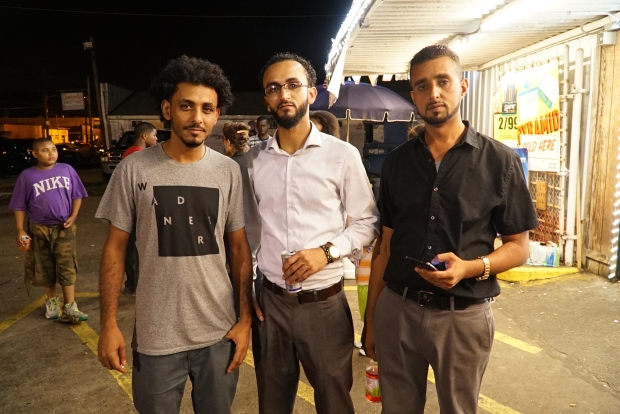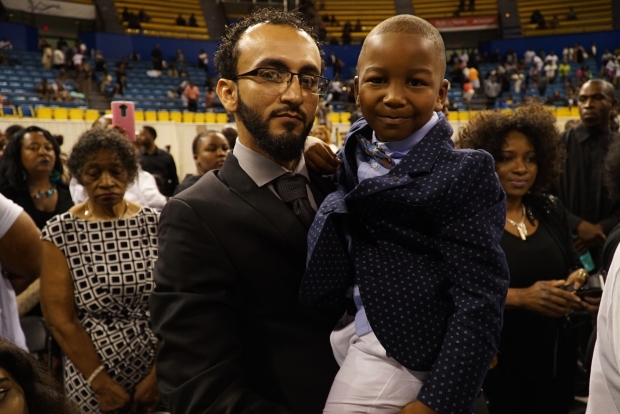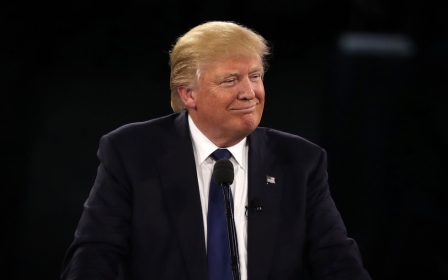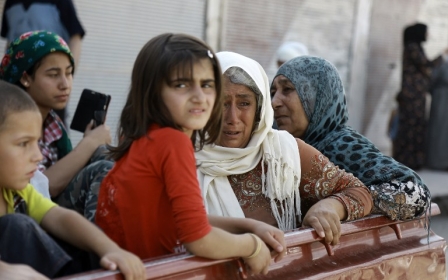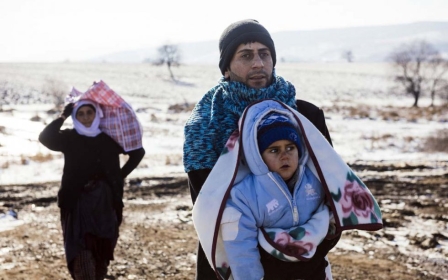Black-Arab unity forged amid US police violence
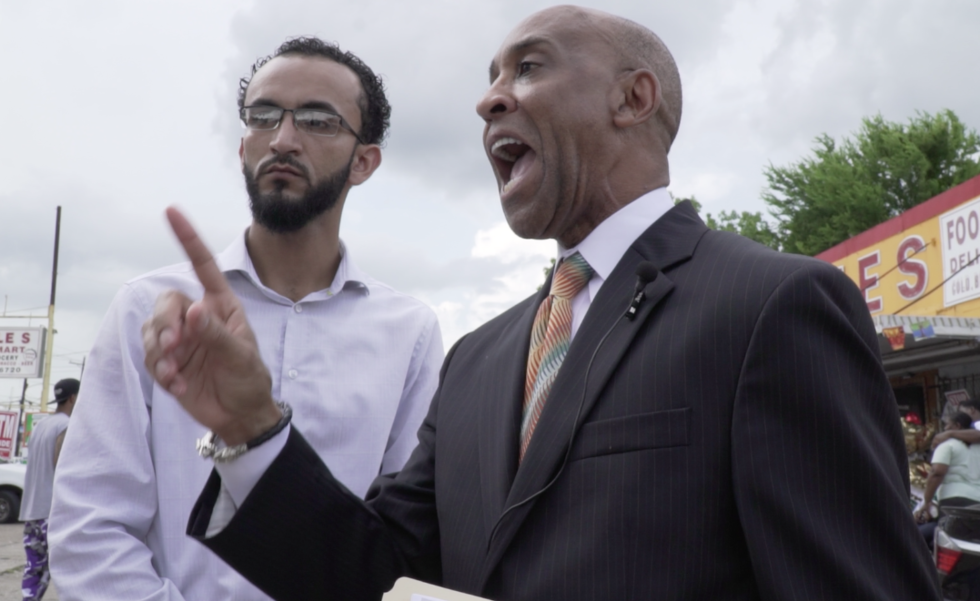
BATON ROUGE, United States - On Monday night, a large crowd of mostly women and children gathered outside the Triple S Food Mart in Baton Rouge to talk about police brutality. Since videos of 37-year-old Alton Sterling’s death by police shooting went viral on 5 July, the Triple S has become the rallying site for Black Lives Matter activities in Baton Rouge.
As the crowd discussed the videos, one resident motioned to a slender Middle Eastern man and shouted, “If it wasn’t for him, we may have never seen another angle of this murder. It shows Alton had no gun [out] as the police claim. It takes a brave man to come forward and bring this truth to us. And this man is not even black, he’s an Arab.”
The crowd applauded loudly and a number of mothers pushed 28-year-old Abdullah Muflahi forward.
“Thank you brother, may God bless you for your courage,” one woman says. Another shouts out “Assalamu aleikum” - an Islamic greeting meaning "Peace be upon you."
A quiet man, Muflahi humbly thanked the crowd and stepped back. He did not intend for his act to make him the unsung hero of the Baton Rouge uprising.
“Who is going to speak for the dead? Alton is gone. He can’t speak for himself. I had to do something,” Muflahi told Middle East Eye. “You know how it is [in Islam]. You do right and you are not supposed to wrong anyone, and if you notice someone being wronged, you cannot turn your eye and walk away. You have to stand up for them and seek justice.”
Muflahi described the night of Sterling’s death as a nightmare he never imagined he would witness.
Muflahi said he felt something was terribly wrong when the two police officers approached Sterling. He watched the altercation from his Triple S store and then took out his cell phone when the police became physical. “The first thing I thought was I have to film this,” he said. Immediately after Sterling was shot, the police turned their attention to Muflahi.
The police officers demanded the surveillance video captured on his store cameras. Muflahi requested to be present in his store if they wanted to take the video. The police officers told Muflahi they would get a warrant. Instead they detained him and stuck him in the back of a hot, stuffy police cruiser while they seized the store’s surveillance video, which has still not been publicly released.
After the police released Muflahi, he gave his cell phone video to a news agency. The video immediately went viral and Muflahi filed a lawsuit against the Baton Rouge police department.
“I don’t like the fact that the police can violate people’s rights because they are minorities,” said Muflahi, who has faced multiple death threats since releasing the video and filing the lawsuit.
Born in Yemen, Muflahi and his family immigrated to the US when he was six years old. They settled in Detroit and Muflahi lived there until a few years ago, when a friend called him and told him about a job opportunity in Baton Rouge.
“It was a nice transition. I never had any issues with the community and one of the first people to welcome me was Alton Sterling.” Muflahi remembers Sterling as a man with a big heart who loved to joke around and make others around him feel good. “He was a good guy. I miss him.”
Baton Rouge is home to a sizable Arab and Muslim community. Historically in the US, it is not commonplace for black and Arab communities to mingle in the same social circles - but in Baton Rouge, the communities are intertwined.
For Muflahi and other members of the Arab and Muslim community, racial profiling and discrimination are nothing new.
“Of course I have faced discrimination because I’m Muslim, I’m Arab and have a beard on me. I’m always profiled, called a terrorist, raghead. I’ve been called awful, hurtful things. I’ve been followed and harassed.”
Muflahi consulted members of the Muslim and Arab community before filing the lawsuit. Many of them advised against the decision, fearing police reprisals.
Fearing police reprisals
After Muflahi went public with the lawsuit, only a few members of the Arab community have stopped in to show their support.
“It’s understandable people are afraid to show up,” he said. “They don’t want to put their names out there like that. There are lots of racist people out there that hate Arabs and Muslims as much as they hate blacks. People don’t want to put themselves in danger.”
“I have people mainly calling the store, threatening my life, saying Muslims are trying to rip America apart from the inside out,” said Muflahi. “It’s just disturbing to even talk about. Being called a terrorist, a sand n*****, a n***** lover, I will pay for thinking I’m black, for supporting the black community. But what am I gonna do? I have to look past it. I fear only God.”
The black community has stood firmly behind Muflahi, including Sterling’s relatives, who consider Muflahi a member of their family now. Members of the black community have been engaging in discussions about Islam. While those attending activities outside the Triple S learn words like shukran (thank you) and assalamu aleikum.
Islam is the second most common religion among black Americans. Many African Americans attending Black Lives Matter rallies either have a black Muslim friend or family member.
“People know about Islam here in the black community,” said Muflahi. “After what happened, people see Islam and Muslims differently, in a more positive light. And I hope what I did makes them realise who we are as Muslims. I hope that message reaches a lot of people.”
Sterling’s family asked Muflahi to be a guest of honour and speaker at the funeral service. When Muflahi was introduced, he was greeted by a standing ovation, with some shouting, “Allahu akbar” - God is the greatest.
At Muflahi first words, “Assalamu aleikum,” the crowd of hundreds answered back “Waleikum assalam” - the formal response meaning, "And on you, peace."
“This has brought the communities closer because we both face discrimination,” Muflahi said.
“Black Lives Matter is a good thing. Black, Arabs, Muslims … basically if you are not white you are being profiled and that must change. We need to change this cycle. The killings and the violence must stop. And it’s a beautiful thing the communities have come together to see this through.”
New MEE newsletter: Jerusalem Dispatch
Sign up to get the latest insights and analysis on Israel-Palestine, alongside Turkey Unpacked and other MEE newsletters
Middle East Eye delivers independent and unrivalled coverage and analysis of the Middle East, North Africa and beyond. To learn more about republishing this content and the associated fees, please fill out this form. More about MEE can be found here.



